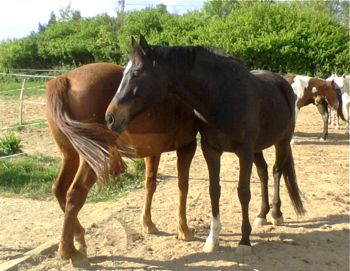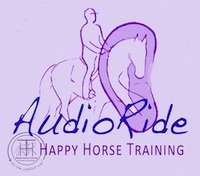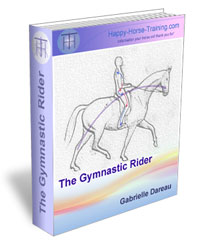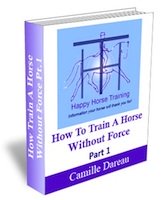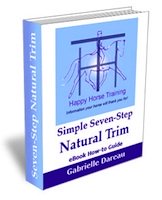|
Horse Behavioral ProblemsHorse behavioral problems can be seen as a consequence of the horse's physical and emotional state, and we must also realize the extent of our personal influence as handlers and riders. Unfortunately there is a tradition in the equestrian world of assuming not only that horses think in a logical way, but also that this logic is in their own interests. For example people often think that if they dismount when a horse is upset for some reason, perhaps out on a ride, that the horse will then think he got his own way (by not having to carry the rider) as a result of behaving badly, and therefore next time he will behave the same way in order to make the rider get off. It is a fairly unintelligent assumption to make, when you consider that many people don't even think particularly logically, and we actually have the intellectual capacity to do so, unlike horses who rarely, if ever, rationalize ideas in their minds in this way. Usually people react in a situation as a result of how they are feeling at that moment, and later on they will tend to think over events and try to make more sense of them in their minds. Maybe it is because we do this, albeit after the event, that we assume horses think about things in this way as well, or maybe it is just that, because horse behavioral problems tend to be evasive by nature, we feel that they are trying to continually defend their own interests. Considering that this would not be an outrageous position for them to take in any case, it is sad how seldom we appreciate how generous and tolerant horses really are. Rather than blaming the horse, we would be more sensible to question why horses so often choose to defend themselves against our demands. We believe that the answer to this question lies in the complicated nature of what we are attempting to do in establishing a rapport with a different species to our own. Not only do we want to take responsibility for their lives, we also want to sit on their backs and control them physically. We don't appreciate the gravity of this undertaking because we have rarely looked at it with a beginners mind. Most horse people grew up around horses, and it has always felt natural. Most of us have never really revised the whole subject in our minds, we have simply accepted the traditions as they were passed down to us, and when we encounter the usual horse behavioral problems, we often resort to treating the symptoms i.e by using harsher bits and gadgets, or move on to a 'better' horse because we didn't 'click' with that one. Of course there is no benefit to the horse in changing traditions only to exploit a new fad or fashion, but if you honestly want to bring what you do and who you are closer and closer to the truth, then it is very important to spend some time studying your technique and your interactions with your horse. 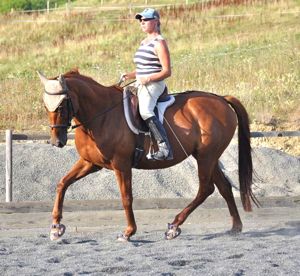
If you view a problem coming up with your horse as an opportunity for you and the horse to heal something in yourselves, then 'problems' become a lot more interesting and less worrying. Working through problems is really just another way of saying 'engaging with life', which is surely why we are here. We believe it is possible for every horse owner to give the horse that they have attracted into their life the opportunity to heal their own traumas or issues as well. In fact, this healing happens in harmony on both sides of the relationship, and it feels so good because we are fulfilling ourselves instead of chasing meaningless prizes. What does it really mean to beat someone in a competition? Horses are not intellectual animals. While most of the time we humans are aware of our thoughts about different things, horses minds are aware of sensations. Their brain and central nervous system are devoted to the perception of the energetic connection which unites everything together. Humans are also capable of this level of sensory perception, but we have let it become dormant in favor of thinking thoughts which unfortunately are often more of a distraction from reality than a step toward it. When we are around animals we often feel good because their clear and genuine perception is a soothing influence. They don't judge because they stay in the present moment more easily than we do. 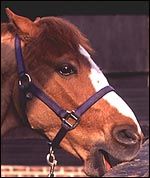
Horses do have their own ways of distracting themselves from reality however, just like we do. There are many different reasons why they do this, but, in our experience, all of them are founded on an unwillingness to remain present in their body, because it doesn't feel good at that time. Common reasons that horses will distract themselves, or even tune out of their normal perception of their bodies and become susceptible to developing horse behavioral problems, are :
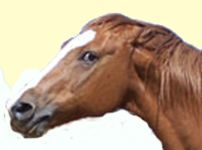 Taking into account that people think in a different way from horses, and as a result it isn't always easy for us to comprehend their behavior, as well as the existence of so many possible ways for horses to feel unhappy within themselves, it is already a challenge to make our relationship succeed. If we add the effort and patience required to train ourselves as riders to be effective enough to balance and support the correct posture in the horse through our own posture, and the will-power and sensitivity we need to train a horse sympathetically yet confidently, we can start to understand why good horsemanship is a serious exploit, and why horse behavioral problems are not uncommon.
Taking into account that people think in a different way from horses, and as a result it isn't always easy for us to comprehend their behavior, as well as the existence of so many possible ways for horses to feel unhappy within themselves, it is already a challenge to make our relationship succeed. If we add the effort and patience required to train ourselves as riders to be effective enough to balance and support the correct posture in the horse through our own posture, and the will-power and sensitivity we need to train a horse sympathetically yet confidently, we can start to understand why good horsemanship is a serious exploit, and why horse behavioral problems are not uncommon. This is also why it is such a fulfilling passion to be involved in, and why so many people are obsessive about it. It loses its magic when we stop putting the horse first though, and there is no way of hiding your motivations from your horse. Of course our role as trainers and riders cannot be overestimated when it comes to the subject of horse behavioral problems. The vast majority of these problems can be avoided if we can become accomplished enough in our interactions with our horses. Often it is a case of recognizing an issue before it becomes a problem, or altering the way we go about things in some way. It is always more fruitful to consider ourselves as the responsible party in the relationship, and therefore take the point of view that if we fix ourselves the horse will follow. Leading by example is our most powerful tool.
Both of these mares above came to us with serious behavioral problems. Through good training, care, and a happy lifestyle, they now trust and respect people. Relevant pages on Happy Horse Training that may interest you: return from Horse Behavioral Problems to Happy Horse Training home |
New from HHT!
AudioRide is a series of exercises designed to listen to while you ride.
Audio descriptions guide you through each step of developing a balanced, dynamic connection with the horse through your position.
This truly innovative learning tool gives you a whole new way of being guided in your riding, in a calm, clear, step-by-step way.
Free Download! Introductory Exercise: Riding in the Now
Click here for full details
The Gymnastic Rider eBook
Now available exclusively from HHT! A unique, comprehensive guide to practical rider biomechanics. This professionally produced eBook takes the rider through the process of developing their body in the specific way that brings the horse's movement into harmony and balance - without force and constraint. Click here for full details, and to download the 15-page introduction for free.
Join the Happy Horse Training group on Facebook!
See and share topical info, news and photo's, and take part in lively discussions.
Click here to go to the HHT group and then click on the 'join group' button.
Join the Whole Horse Newsletter
HHT's free monthly newsletter giving you wide-ranging and intelligent insights into holistic horsemanship.
Just enter your details below to join.
Free bonus on the riding position with all new subscriptions: Ten Top Tips To Instantly Improve Your Connection With Your Horse.
Click here to see back issues of The Whole Horse newsletter
Train Your Horse
The Holistic Way
How To Train A Horse Without Force is a unique guide to training horses through energetic connection and gymnastic training. Part 1 covers everything on the ground, from handling to the lungeing technique that develops strength, straightness and engagement. Comes with a free eBook supplement on Horse Trauma.
Click here for more details.
What people say about the eBook:
"OMG! I'm BLOWN AWAY by this text [...] It's one of the best horse training texts I've ever read." - Wendy Kendall
"I realized that I haven't yet written you about the impact that your training e-book has had on me, and I want to let you know how inspiring and helpful I found it. As a student of Zen Buddhism for nearly three decades, I've often wondered when someone was going to write the book on Zen and the art of horsemanship, and I think that your emphasis on mindfulness and energy connection gets right at the heart of the matter. It has certainly deepened the way that I relate to and communicate with my horses. I am reasonably sensitive to horses' body language and mood, but new to me was the idea of feeling their energy in a more subtle way - including their connection with me even when I am not directly working with the them. I have made myself more aware of this communication, and it's pretty amazing. I have started grooming differently, too, treating a grooming session as a time to mindfully listen to my horse instead of a way to dust out an old rug (OK, I wasn't quite that bad, but you get the idea). Additionally, I have made myself more open to how I actually feel about the horses themselves - very enlightening. Overall, I think that you are saying something that no one else is saying but that everyone ought to hear." - Tess Lloyd
Do You Have
A Horse Story
To Share On HHT?
So many people have been through wonderful experiences with horses, whether in training or otherwise. If you've made a change in a horse's life - or one has made a change in yours - tell us about it here.
Learn How To Trim
Your Own Horse's Feet
The Simple Seven-Step Natural Trim is a comprehensive step-by-step guide to a cutting-edge barefoot trim. Click here to find out more.
What people say about HHT:
"The riding instruction is outstanding, if instructors in the UK taught this way there would be a lot of happy riders and horses."
"The riding tuition exceeded my hopes and expectations by a long way; giving me an exciting new facet to horsemanship which is lighter. more subtle, more elegant and more meaningful. It is as if a new door has opened bringing more sunlight and air."
"My goodness - what a change has taken place in my riding. I think that I'm starting to sit 'into' the horse rather than on top of him. I felt my horse's movements in a way that has almost never happened before"
Click on Testimonials for more





